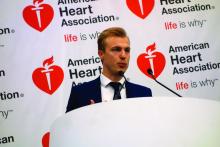ANAHEIM, CALIF. – Children and young adults with type 1 or type 2 diabetes have a 7.4-fold increased risk of sudden cardiac death, compared with nondiabetic, age-matched controls, according to a first-of-its-kind Danish national study.
“Luckily the absolute risk is low, but we hope these data will make [young patients with diabetes] think more about taking their insulin and following their physicians’ recommendations about treatment,” Jesper Svane said in presenting the study findings at the American Heart Association scientific sessions.
The study population consisted of all Danes aged 1-35 years in 2000-2009 and those aged 36-49 years in 2007-2009. During that 10-year period, which included 27.1 million person-years of follow-up, there were 14,294 deaths, including 669 persons with diabetes. Of the deceased diabetic patients, 70% had type 1 diabetes.Sudden cardiac death (SCD) was the No. 1 cause of mortality in the diabetic cohort with a rate of 34.8 deaths/100,000 person-years, compared with 4.7 deaths/100,000 person-years in an age-matched nondiabetic cohort. That translates to a 7.4-fold increased risk of SCD in the diabetic cohort, noted Mr. Svane, a medical student at Copenhagen University.
When deaths caused by SCD were combined with those from other cardiac diseases, the young diabetic cohort had a rate of 68.3 deaths/100,000 person-years versus 8.2 deaths/100,000 person-years in age-matched controls, for an 8.3-fold increased risk. This observation underscores an important point: Monitoring cardiovascular risk needs to start early in young patients with diabetes.
“It’s important to pay attention when a young person with diabetes comes in complaining of chest pain or syncope,” Mr. Svane said.


